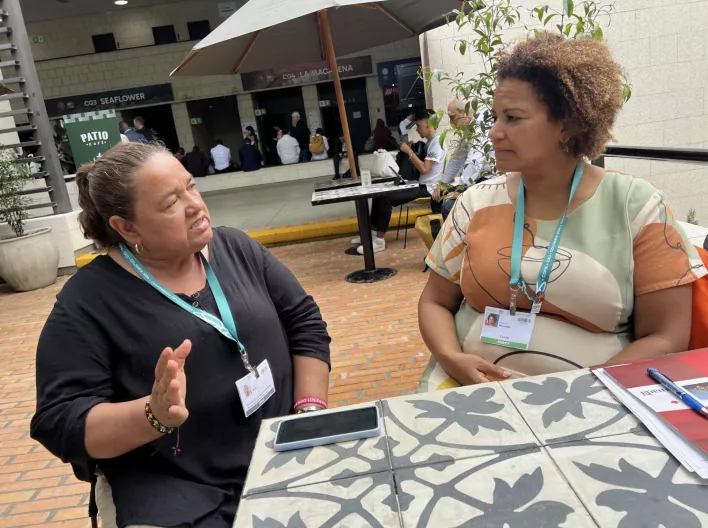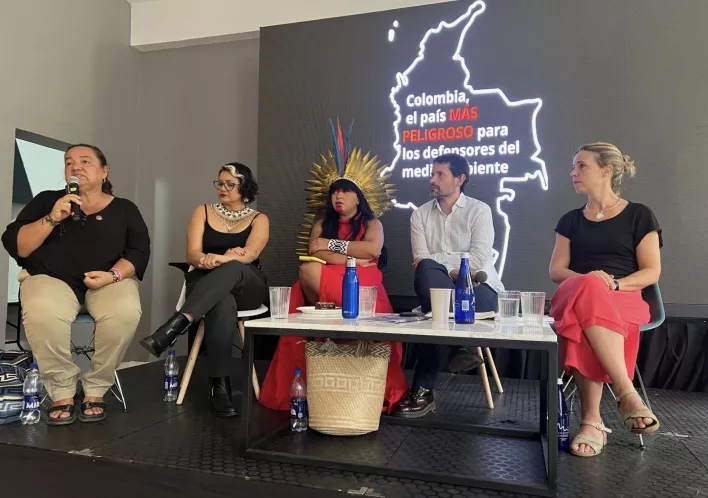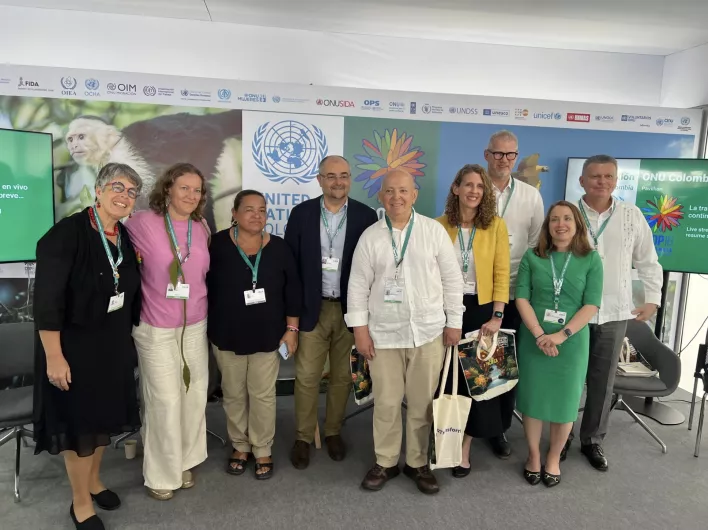“One’s leadership should not be focused only on one part, but I believe that as leaders of women, we have to put ourselves in a framework that is to do good.”
Jani Silva

Introduction
Jani Silva was born in the heart of the Amazon, and since birth has lived a life interconnected with nature. However being at the center of one of the most prosperous jungles also means being at the epicenter of the dangers of the jungle —including the violence of climate change and fractured, armed groups forcing the production of coca. In Colombia, Global Witness has recorded that 382 land defenders lost their lives between 2012-2022, murdered for their work protecting the land and environment. In 2023, Front Line Defenders documented that Latin America accounted for 79% of the murders of land defenders in the entire world with Colombia leading as the most dangerous. The Colombian civil society network Somos Defensores documented that only 5.2% of all killings have been legally resolved. Jani’s roots in the land are deep and expansive, allowing her to continue her work to protect the Amazon while facing tough battles to ensure a better future for her communities.
A Natural Leader
During her adolescence, Jani often accompanied her mother to social movement spaces in the community. She became a valued pillar of the community as one of the few individuals who could read and write well. Throughout the meetings, she heard the troubling stories of injustice happening in her community, pushing her to become more involved as she built relationships with various community members. Her work like many defenders began informally but quickly she became the voice of the community, reporting human rights abuses and mediating inter-personal conflicts even when doing so placed her in harm’s way. As a “rural inspector” Jani responded to calls for help in even the most remote areas. Ensuring her community was safe was always her priority. Later as the President of the Association for the Integral Sustainable Development of the Perla Amazónica (ADISPA) where she carries out the work of territorial management and education—Jani’s commitment to her community’s well-being has proven powerful.
Protecting Land and Community Against All Odds
In the late 1990s, the place that Jani Silva called home in Putumayo had become a complex intersection of the socio-political struggles of Colombia’s war on drugs. There were coca growers, large-scale fumigation, and an increase in military presence which forced Jani’s community to take active steps towards protection - they organized a Peasant Farmer’s Zone. Jani led the way ensuring that each community was consulted in the ideological and technical formation of what would become the Perla Amazónica Peasant Reserve Zone (ZRCPA) at the end of 2000. Several accomplishments have resulted from ADISPA’s work including creating protection for wild animals, new hunting practices, and the dedication of each plot of cultivated land to conservation - it was a process of reimagining their relationship with nature and the ecosystem within their community. However, armed actors would see these changes in direct opposition to their goals for extraction of the area’s natural resources and ZRCPA and those involved began to receive threats.
Oil Expansion in the Region
An increase in threats towards the community coming from multiple angles caused many community members to become less active in the early 2000s, according to accounts shared by Jani in interviews, and the lack of community organizing ultimately left room for oil companies to slowly encroach on their land. There was an attempt to prevent the contamination of soil and water sources by community members who asked the companies to use existing oil wells and not to open new ones. However, this did not happen, and the anonymous threats returned when the communities made their first complaints. Another tension was the division in the community on the issue. Due to the area’s complicated history, some prioritized safeguarding the area’s environment while others saw the oil companies as employers and development for the region. Nonetheless, community-led ZRCPA moved forward with complaints. alleging that the company has not respected its commitment to repair the environmental damage caused by the unauthorized expansion within ZRCPA.
Decades of Resilience
Throughout the years that PBI has provided protection to environmental and human rights defenders in Putumayo Jani has faced severe repercussions for her work. PBI has been accompanying her throughout her career and has built a strong relationship of which Jani remarked about PBI’s impact, “when we have large events and PBI isn’t there I feel that I am unprotected.” She was an outspoken supporter of Colombia’s 2016 peace accords specifically in relation to crop substitution programs. In 2018, the IACHR requested precautionary protective measures for Jani as well others in her community. Jani is also under protection through the National Protection Unit under the Ministry of the Interior of Colombia but even these measures have not shielded her from serious threats against her life. In July 2021, the Justice and Peace Commission who also accompanied Jani uncovered a plot by an armed group to murder Jani. As recently as September of this year she received a phone call threatening to “blow you up, car and all.” These documented attacks along with all other threats, including surveillance by the military and armed groups and gunshots near her home, have caused Jani psychological stress and harm. Despite it all, she remains steadfast in her commitment to change.

Humanity Owes a Collective Debt to Nature
Speaking of Jani’s commitment to change, while government officials debated draft text at the recent COP16 biodiversity summit, held in Cali, Colombia from October 21, 2024 to November 1st, environmental defenders sounded the alarm about the dangers of actually protecting biodiversity in the Amazon rainforest and elsewhere. PBI-USA NCC member Andrew Miller was present at COP16 and captured some of Jani’s strategic advocacy and the advocacy of PBI field volunteers during the gathering.
Andrew reports - Jani Silva, in her role as legal representative for the Amazon Pearl region which runs along Colombia’s border with Ecuador, traveled to the city of Cali to speak out. In a public event hosted on the sidelines of the negotiations, Jani outlined the precarious situation she and many others face: “The threats continue against peasant, Afro and Indigenous leaders who defend their territories and environmental rights.” The danger emanates from illegal armed groups that have murky ties to multinational oil companies through their local subcontractors.
She said the situation deteriorates when community organizations denounce natural resource exploitation and the resulting contamination from those companies. “Given the risks, we are forced to leave our territory, breaking the connection we have there with the land and our families.
Fortunately, there are some protection strategies that can be put in place. One, Jani outlined, is simply doing the work well and maintaining the confidence of the communities. Another key strategy is accompaniment. “The visibility that international accompaniment offers us, through visits and the general knowledge that they are there with us, provides our community-based organization with a lot of protection.”
For the last many years, Peace Brigades International has provided protective accompaniment for Jani and other leaders of the Amazon Pearl in their own territory, where they are at the greatest risk. At the COP16, the PBI team (and several former PBI field volunteers, myself included) facilitated dialogues between Jani and ambassadors from Europe and Canada.
At an event hosted in the United Nations pavilion, the Swedish Ambassador to Colombia acknowledged Jani from the stage, qualifying her as “one of the bravest women in Colombia who is defending the environment in the midst of the armed conflict.”
Not one to miss an opportunity, Jani personally invited all the Ambassadors to travel to the Colombian Amazon and attend the Amazon Pearl’s 24th anniversary in late November. She testified that, “This accompaniment has allowed our process to continue. Believe me, when the violent actors see that our processes are accompanied, they respect us a little more.”
At the biodiversity summit, Jani appealed for unity and a collective effort. She said, “All of humanity has a collective debt to nature and we need to exert ourselves to defend, recuperate and pay that debt to the Earth.” PBI is committed to seeing that such debt isn’t paid with the lives of the brave activists who are defending biodiversity for all of us.

Conclusion
Jani Silva’s decades of work and the risks she takes to protect her community, the land, and our shared planet have been recognized through nominations for the Nobel Peace Prize. However, what gives her the most hope is the younger people in her own community who are embracing different ways of living. From integrating organic vegetable gardening or learning to not throw candy wrappers on the ground, the youth will be the ones leading the way. For Jani, it is incredibly important to acknowledge the past and to heal but she is looking forward to a better and brighter version of what the world could be.
Developed with contributions by: Yadira Sánchez-Esparza and Andrew Miller
